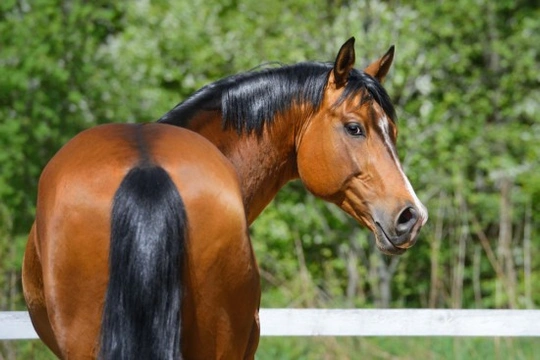
Horses and colic
Colic refers to the symptomatic abdominal pain that horses can suffer from as the result of a range of possible gastrointestinal conditions and problems. Colic can be caused due to many different contributing factors, and the root cause of any case of colic may not always be obvious or identifiable. Colic is a potentially serious condition, which left untreated, can lead to the further complication of twisted gut, and can prove fatal. It is estimated that around 10% of horses will suffer from at least one bout of colic at some point over the course of their lives.
Symptoms of colic
There are a wide range of different symptoms that may manifest in a horse suffering from colic, and your horse may display just one or two of these, or any number of them in combination. Colic is generally acute in onset, and can quickly progress from a moderate stomachache to a very painful and potentially life-threatening condition. If your horse has colic or you suspect that they may be in the early stages of developing colic, you should call your vet immediately as a matter of urgency.Be on the lookout for the following signs and symptoms:
- Excessive salivation
- Disinterest in food
- Constipation of not passing stools normally
- Heightened pulse rate
- Darkened mucous membranes in the mouth and eyes
- Pawing at the ground
- Straining to urinate frequently
- Turning around to gaze at their stomach, and pawing at it and/or biting at it
- Restlessness and inability to settle
- Rolling, and keeping getting up and down
- Making pained noises
- Rolling the top lip back over the teeth
- Grinding of the teeth
Treatment of colic
As mentioned, colic is a veterinary emergency, and should not be left in the hope that it will resolve itself. Call your vet and explain the symptoms, and ask your vet to attend as soon as possible. Depending on the type of symptoms that your horse is exhibiting, the likely causes of the colic developing and the severity of the problem, your vet may decide to treat your horse in a variety of different ways.
- Surgical intervention is sometimes indicated in very severe incidences of colic, where it is suspected that the gut has twisted or that the stomach may be in danger of rupturing
- Anti-inflammatory and pain relieving drugs may be used to reduce the symptoms and help to resolve the colic
- Lubricating the intestines in the hope of helping your horse to naturally pass an impaction or obstruction may be indicated, and is administered by means of placing a tube down the throat to dispense a softening or lubricating fluid into the stomach
- Drugs to stimulate the digestive system and either speed up the digestive process or slow it down may be indicated
- Gentle exercise such as walking or light lunging may be advised in milder cases, as this totally non-invasive treatment method can help a case of colic to resolve itself naturally
The prognosis for horses with colic
Some horses and ponies are more prone to suffering from colic than others, and while colic is often an isolated, one-off occurrence, other animals will be at an increased risk of developing colic again in the future after their initial bout. Colic is one of the more common potentially serious conditions that horses and ponies can be prone to, and due to this, the knowledge and awareness of colic and its symptoms by the horse riding community tends to be fairly good. This often leads to the symptoms of colic being identified and treated early on, giving the horse or pony the best chances of making a full recovery. The survival and recovery rate for horses with colic varies greatly, and in a large part depends on how quickly the condition is identified, and treatment for it sought. Mild colic, and even more severe cases that are treated appropriately can generally be resolved, although treatment can be costly and take several hours to take effect. In more serious cases, particularly where the stomach ruptures or the gut twists, the mortality rate is significantly increased, as treatment is much more difficult and generally involves surgical intervention.
Prevention of colic
It is not always possible to prevent colic, because it is not always possible to identify the underlying cause of the condition, although a range of common factors such as worm infestation, incorrect feeding and other issues often contribute to it. There are, however, various ways in which you as a horse owner can minimise the chances of your horse or pony developing colic, and try to prevent colic from occurring in the first place.
- Ensure that your horse is wormed regularly and appropriately
- Make sure that your horse’s teeth are kept in good condition, and have overlong or sharp teeth rasped down
- Take care when turning your horse out to pasture, particularly for the first time during the summer, that they do not gorge themselves on fresh grass
- Gulping food and eating too quickly can lead to colic, so try to slow down the rate at which your horse eats by feeding little and often, or placing obstructions in their food buckets that they will have to eat around
- Take care not to overfeed, or to feed foods that are too high in energy or too rich for your horse’s digestive system or working patterns
- Make any changes to your feeding regime gradually
- Do not exercise your horse or pony immediately before or after feeding
- Make sure that your horse always has free access to fresh drinking water, and that it is not too cold
- Make yourself aware of the signs and symptoms of colic as detailed above, and be on the lookout for any early symptoms within your own horse or pony.



